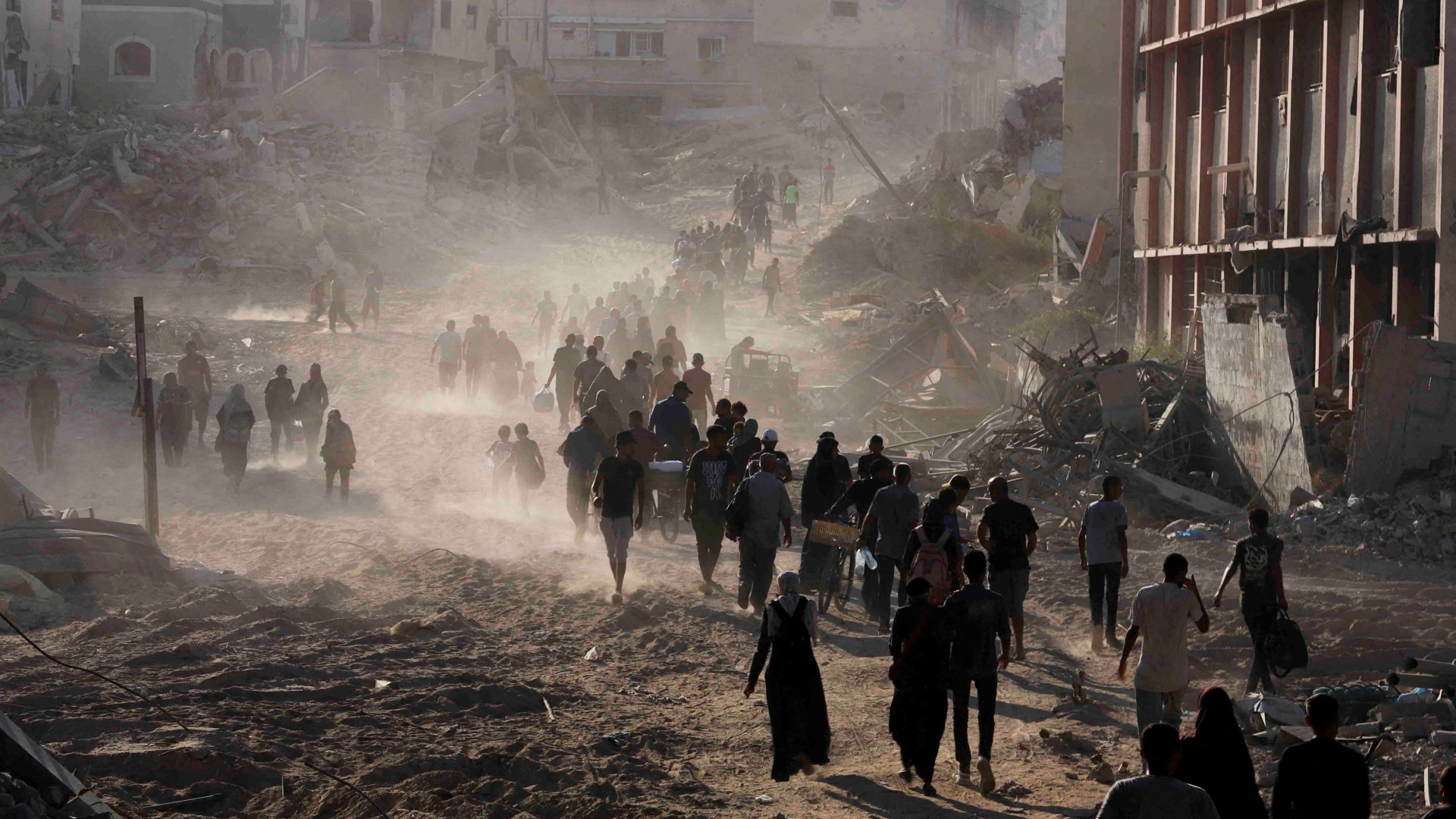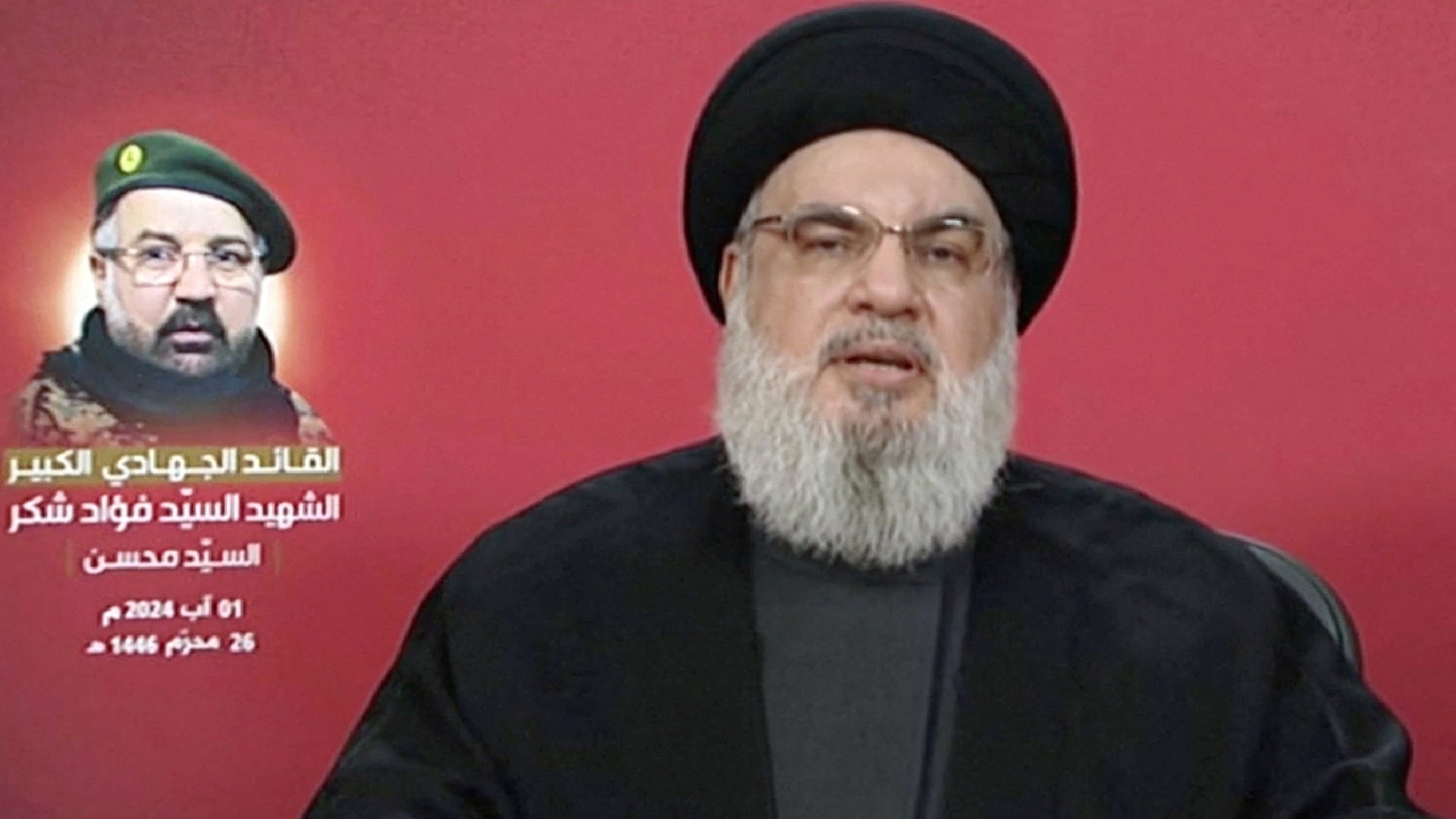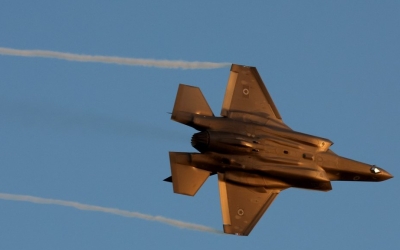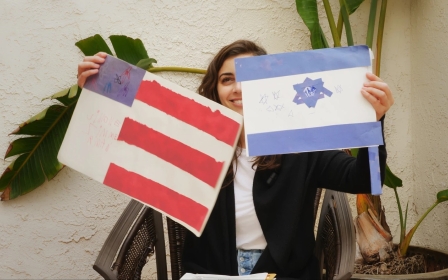Netanyahu seeks continuous war as Israeli centre left favours state power
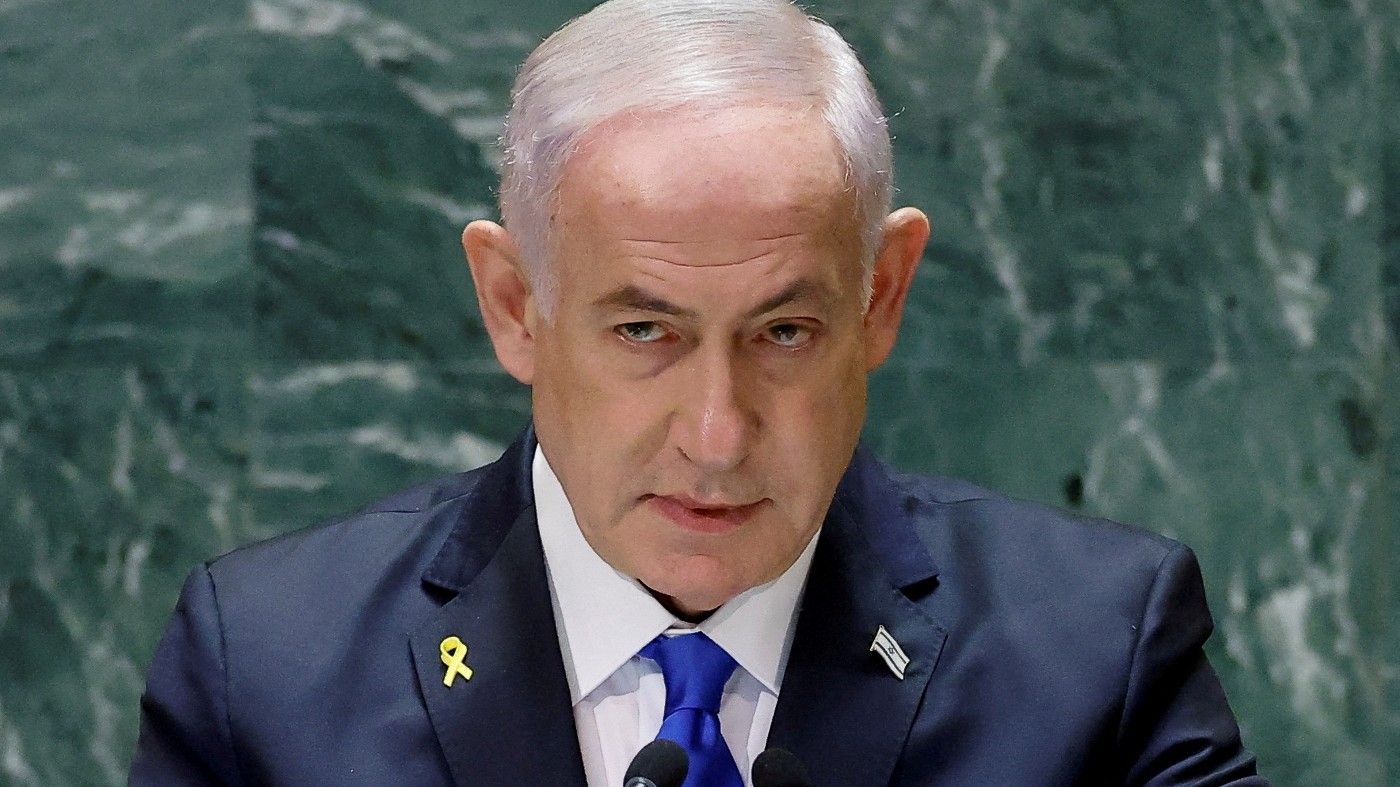
Last week, Israel’s Channel 12 announced a “dramatic voter poll”. It was dramatic, just not quite in the way Channel 12 intended.
Prime Minister Benjamin Netanyahu’s Likud party was in first place but was picking up seats at the expense of its far-right coalition partners Otzma Yehudit, led by Itamar Ben Gvir.
Despite the killing of Hezbollah leader Hassan Nasrallah, the pager and walkie-talkie attacks and the damage inflicted to the Lebanese movement’s missile stash - all largely thought of in Israel as dizzying, even historic triumphs – the poll was not handing Netanyahu’s ruling coalition a single new seat. Dramatic indeed.
This is surprising, and not just because of the successful assassination of Nasrallah, a figure Israelis had come to see over the last 30 years as the epitome of evil and whose death saw presenters at the same Channel 12 raise a glass of arak and offer a biblical toast along the lines of “May all your enemies perish, Lord”.
Even more surprising is the Israeli public’s near-total embrace over the last three weeks of Netanyahu’s declared desire to prosecute a war for “total victory”. Prior to this, hundreds of thousands of people were out on the streets, demanding a “deal now” and accusing the prime minister of prolonging the war for his own ends.
New MEE newsletter: Jerusalem Dispatch
Sign up to get the latest insights and analysis on Israel-Palestine, alongside Turkey Unpacked and other MEE newsletters
Now, it seems the majority of Israel’s Jewish public, from Ben Gvir supporters to fans of the centre-left Zionist Yair Golan, wants a never-ending war. Even the first casualties from the ground invasion of Lebanon are not shifting this support – at least so far.
In other words, Netanyahu’s proposition has shifted public opinion but has not quite translated into greater personal support; it has merely resulted in a minor movement of voters from Ben Gvir’s column to his.
The army and the opposition
One explanation for this is that the credit for the initially crushing attack on Hezbollah is being handed to the entire security apparatus, the Mossad foreign intelligence agency, the Unit 8200 army intelligence and the air force, which Netanyahu, his family and supporters blamed for Hamas-led attacks of 7 October, as well as for Israel’s failure to achieve “total victory” over the Palestinian group.
In the Israeli opposition’s view, however, these are the very people - often derided as Hamas-loving protesters by many Netanyahu supporters - who planted the captured pagers, knew the location of every senior Hezbollah figure and bombed them accordingly.
Netanyahu's opponents did not fail to catch this political and sociological aspect. Ben Caspit, a journalist associated with the anti-Netanyahu protests on the one hand and the army on the other, reminded communications minister Shlomo Karhi that he had told air force pilots to “go to hell” in March 2023. “But they went to Dahiyeh. The achievements of this war belong to them,” Caspit wrote.
Other commentators reminded right-wing publicist Caroline Glick of her call to “dismantle Squadron 69”, the squadron that bombed Nasrallah's bunker and “throw the whining gangsters out of the army altogether... and establish a missile and drone corps”. Netanyahu's comments, in the days of the judicial coup - that Israel “can manage without a few squadrons, but not without a government” - were also exhumed.
But this is not just about the sociology. The attack on Hezbollah aligns with Israel's “classic” security doctrine dating back to David Ben Gurion’s time and is still going strong: war must be initiated by Israel, must be waged in enemy territory and, above all, must be quick.
It is no coincidence that even Al Jazeera’s commentators compared the early blows inflicted by Israel on Hezbollah to the defeat suffered by Arab armies in 1967. “We’ll hit them fast, hard, fast and elegantly” was Israeli commander Haim Bar Lev’s famous statement on the eve of the 1967 conflict. Even those who do not remember Bar Lev can see that this is what Israel has been looking to replicate in Lebanon in the last few weeks.
The attack on Hezbollah fits the dominant approach the army has taken in recent decades: respond disproportionately to any attack so that the other side will “learn its lesson” and agree to a ceasefire. This idea of “deterrence” holds that the stronger the disproportionate response, the longer Israel will enjoy an ensuing period of peace.
'War between the wars'
In the army, they called it “the war between the wars”. Yagil Levy, an Israeli political sociologist, draws a direct connection between this approach and the Netanyahu government.
“The political approach during the Netanyahu era - avoiding the pursuit of a political settlement for military conflicts - encouraged the army to develop technological solutions that would prevent war, and without risk to combat soldiers”, Levy wrote in Haaretz.
“The more that was achieved tactically by the war between the wars, the less pressure there was on the politicians to pursue a political path and the more the army was driven to increase the fighting, and so forth.”
The concept of deterrence was criticised after 7 October as it was seen as contributing to a sense of complacency that allowed Hamas’ preparations to go undealt with. But now, in Lebanon, the concept of deterrence is evidently making a comeback.
And because the army accepts this concept, it is also accepted by the Jewish Zionist centre left, which is always inclined to accept the position taken by the security establishment. The anti-Netanyahu protests on Balfour Street and later Kaplan Street that presented “being a state” as an alternative to the prime minister’s “being factions” only strengthened this identification with the army, which was always perceived as the most refined expression of this statehood.
For this reason, as soon as the army is seen as responsible for the successes in Lebanon and not Netanyahu, the centre-left camp stands almost as one man behind it. To a certain extent, it can be said that if the war in Gaza belongs to Netanyahu, the attacks on Lebanon belong to his opposition.
Who killed Nasrallah?
This tension between “Netanyahu’s war” and “the army’s war” also manifests in the struggle for credit around the Nasrallah assassination.
According to one account, in the final discussion about the planned hit held prior to Netanyahu’s departure for the United National General Assembly in New York, Defence Minister Yoav Gallant, joined by the entire security establishment, supported the campaign while far-right ministers such as Bezalel Smotrich and Yariv Levin opposed it. Netanyahu was reportedly ambivalent.
According to Jacob Bardugo, Netanyahu’s confidant, Gallant hesitated and Netanyahu approved it, with his entire trip to New York a “diversion” to mislead Nasrallah.
The battle for credit is indicative of the tension between Netanyahu and the army in general, and between him and Gallant in particular. It did not help that in the same survey on Channel 12, 43 percent of respondents rated Netanyahu as “overall good” and 53 percent rated him as “overall bad”, while the picture was almost the reverse for Gallant and army chief of staff Herzi Halevi (58 percent “overall good”, 34 percent “overall bad”).
But there may be something deeper here.
Even if it was Netanyahu who pressed for the assassination of Nasrallah and the army that hesitated - rather than the other way around, as many claim - it is quite clear that the massive amounts of intelligence collected on Hezbollah were accumulated long before the war. This could explain why Gallant supported an all-out attack on Hezbollah shortly after 7 October, while Netanyahu opposed it.
Netanyahu later admitted that he resisted an 11 October attack due to US pressure. However, we can consider another possibility that may explain his resistance at that time and his hesitation now, if any.
Netanyahu's status quo
Until 7 October, Netanyahu had boasted that he was cautious about embarking on military operations. This was not, in my opinion, due to concern for human life. The unprecedented brutality and inhibitions of the war in Gaza and the deliberate abandonment of the hostages show that this is not a consideration for Netanyahu.
What is going on with him is the desire to maintain the status quo.
This means continuing the occupation, expanding the settlements and, above all, thwarting any possibility of negotiations with the Palestinians at the end of the conflict and the establishment of a Palestinian state.
In Gaza, Netanyahu has now basically reached a kind of status quo. Of course, Hamas still exists and the hostages have not returned. But that does not seem to bother him; maybe even the opposite is true. Hamas is now significantly weaker than it was before 7 October. Its ability to trouble Israel and Israelis has greatly diminished. The very fact that it continues to rule Gaza in a civilian capacity serves Netanyahu because while Hamas is in power, there is no chance of the Palestinian Authority returning to the besieged enclave and no chance of any political movement flourishing.
Therefore, in Gaza, Netanyahu has decided in favour of a war without an expiration date because an end to the war could threaten his rule. As Franklin Foer recently revealed in the Atlantic, Israel has no interest in the return of the hostages.
In Lebanon, the situation is different, as this status quo has yet to be achieved and Hezbollah continues to be a real threat. The Lebanese movement is also integral to the Iranian axis in the Middle East.
Netanyahu not only sees this axis as his great enemy but also believes that Israel's willingness to fight against Iran and its affiliates is its greatest asset vis-a-vis the West, particularly the Americans, whether under a Democratic or a Republican administration. This, as former Israeli negotiator Daniel Levy has explained, “is also America’s war”.
Continuous war
It may be that in Lebanon, too, Netanyahu is in no hurry to end the war, as a ceasefire with Hezbollah may oblige Israel to embark on some kind of political initiative, including a possible agreement for a ceasefire in Gaza - not to mention that an end to the war could bring an end to his time as prime minister.
Gideon Sa'ar may add support to the government while it fights but may leave once a ceasefire is reached, similar to Smotrich and Ben Gvir.
A fatal blow to Hezbollah strengthens Netanyahu's thesis regarding a never-ending war and puts the centrist camp wholeheartedly behind the war effort, if not behind the prime minister personally.
But the power of the blow already dealt by Israel raises the danger of all-out regional war, which could finally prompt a US intervention - though that is far from guaranteed.
This may explain Netanyahu's hesitation to dramatically intensify the attack in Lebanon. He does not want to end the war unless ending it means the complete and unconditional surrender of Hamas and Hezbollah, which will not happen.
As long as the war in Lebanon continues, the interests of the army and Netanyahu, despite the tensions between them, intersect and even reinforce each other.
But while Netanyahu resists ending the war, the army does not oppose it. It pushed for an end to the war in Gaza and may agree to its end in Lebanon after the long-awaited “deterrence” is achieved or the ground invasion of Lebanon exacts a very high cost in soldiers' lives, which may lead to public pressure on the army to call a halt.
In this context, it is worth remembering that the 1973 Middle East war ended with a considerable Israeli military achievement, with the army stationed 100km from Cairo and in the suburbs of Damascus.
But six years after the end of that war, the peace deal signed by Israel and Egypt required an Israeli withdrawal from the entire Sinai Peninsula. Today, Netanyahu will accept no such price when it comes to the West Bank and Gaza.
Middle East Eye delivers independent and unrivalled coverage and analysis of the Middle East, North Africa and beyond. To learn more about republishing this content and the associated fees, please fill out this form. More about MEE can be found here.



